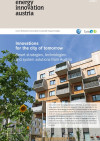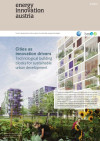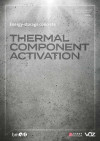Suchergebnisse für "Factsheet: Energietechnologien gestalten, die für alle sinnvoll und nutzbar sind"
Innovations for the city of tomorrow

Smart strategies, technologies and system solutions from Austria
energy innovation austria
4/2016
Herausgeber: BMVIT und Klima- und Energiefonds
Englisch, 16 Seiten
Downloads zur Publikation
Cities as innovation drivers

Technological building blocks for sustainable urban development
energy innovation austria
4/2013
Herausgeber: BMVIT, Klima- und Energiefonds
Englisch, 8 Seiten
Downloads zur Publikation
Energy-Sponge: The Building as an Energy-Sponge - Electricity In - Heat Out
Innovative, dynamic control concepts had been developed which enable (air) heat pumps in combination with PV- or renewable grid electricity to use the building mass of a multi-familiy house as heat storage. User acceptance had been evaluated and possible business models had been developed.
M-DAB2: Material intensity of inner development - resource assessment and localization of urban development potentials
For the first time, the material intensity of inner development (in terms of material quantities) for different design variants is to be considered in the evaluation of inner development potentials. A set of methods for the holistic evaluation of potential areas and different development variants and scenarios for resource-saving inner development will be created.
Reallabor 100% renewable energy Waldviertel
Under the motto "Always one step ahead", the aim is to develop a content-related and economic implementation concept for a "Reallabor 100% erneuerbare Energie Waldviertel".
Energy-storage concrete: Thermal Component Activation

This planning guide provides information on the option of solely heating and cooling small-volume residential buildings by means of thermal component activation (TCA). Concrete instructions on the planning of residential buildings with thermally-activated ceilings are also provided.
Felix Friembichler, Simon Handler, Klaus Krec, Harald Kuster
Herausgeber: BMVIT
Englisch, 122 Seiten
Downloads zur Publikation
CityCalc - Calculation Tool for Energy-Efficiency in Urban Planning
To assess the energy performance of urban planning projects in early design stages with low input and evaluation effort within the project CityCalc, an easily applicable planning and evaluation tool has been developed.
REC-Businesspark - Investigation of the first Austrian renewable energy community business and industrial park
In the course of the project, the conceptual design of a zero-emission or plus-energy business park in Weiz with a focus on photovoltaics and fuel cells in combination with a Renewable Energy Community (E-EGe) had been carried out. By establishing the park on a "greenfield", all structures can be created according to the requirements of the E-EGe.
ENUMIS - Energetic effects of urban manufacturing in the city
The project examines the challenges of urban manufacturing (UM) from the energy perspective and shows opportunities arising from the implementation of UM concepts for the future design of sustainable energy systems for cities.
SUPERBE - Potential of Superblock-concepts as contribution to planning energy-efficient urban quarters
The exploratory study SUPERBE for the first time looks into the applicability and potential effects of Superblock concepts in an Austrian urban context in order to assess their contribution to energy-oriented urban planning.
TFlex - Temperature-flexibilisation in low-load operation of local district heating systems
Within the research project TFlex it was checked if the losses adherent to small district heating networks during low-load periods can be reduced. One possible solution is by deactivating the network and supplying the customers from previously charged decentralized storages. The optimal clustering of the storages and the possibility of solar-charging the storage were calculated with the aim of a guaranteed one-hundred percent heat supply.
CiQuSo - City Quarters with optimised solar hybrid heating and cooling systems
The project CiQuSo aimed to develop, evaluate and optimize concepts for solar energy systems to provide energy for buildings and cities. The applicability of the developed methods and concepts were shown as an example at Itzling, a part of Salzburg city.
EnerPHit-green concept Modernisation of a historic building with application of an aerogel insulation plaster
This demonstration project shows the comprehensive modernization of a historic building within the constraints of a regional protection zone. By using the Aerogel high-performance insulating plaster, a comprehensive energy-efficient building refurbishment had been realized without changing the outer appearance of the façade.
Syn[En]ergy: Development of Potential Synergy Effects between the Interdependency of Urban Planning goals and Photovoltaic Usage on Open Urban Landscapes
Open spaces such as parking lots, brownfields and some categories of recreation areas offer an underutilised potential for photovoltaics in urban regions. In the course of Syn[En]ergy an inter- and transdisciplinary approach potential synergies and conflicts with other use demands were investigated, a typology and practical solutions for selected areas with regard to requirements from economy, urban planning and design, legal as well social aspects developed, and then evaluated by stakeholders from enterprises, administration and the general public.
Sozial100%Erneuerbar: 100% renewable heating and cooling supply in social housing - the demonstration project Käthe-Dorsch-Gasse
100 % renewable (on-site) heating and cooling supply in social housing while achieving good living comfort. Implementation, monitoring and optimisation of an overall heating and cooling system that has not yet been implemented in this combination (especially in social housing).
Low Tech - High Effect! An overview of sustainable low-tech buildings: realized best practice examples, innovative approaches, principles and systematic solutions
In this study approaches of low-tech buildings were examined and particularly innovative and representative concepts were documented in detail. The aim was to elaborate the current state of the art and the existing know how and knowledge on the basis of realized examples as well as to show potential for further development.
Spatial Energy Planning for Smart City Quarters and Smart Regions
In the project ERP_hoch3 energy related policy research in three Austrian agglomerations (Vienna – Lower Austria, Graz – Styria and Vorderland-Feldkirch) has been done, scenarios of the current state and the target state have been modelled and calculated. The aim was to develop generic transferable recommendations for spatial energy planning in agglomerations.
Urban Mining - Energy and resource savings due to urban mining
The use of natural resources in long-lived products and buildings has led to the build-up of enormous urban material stocks. The present project analyses the potential of these urban mines to increase the resource efficiency of modern cities.
Future Quarter - Way to an energy-plus quarter in Vienna
Development of transferable concepts for energy-plus quarters as substantial preparatory work for the implementation of an energy showcase quarter in Vienna based on six concrete areas. The support for the broad application of the concept shall be a precursor for the realisation of future energy showcase quarters in Vienna and other cities.
mAIntenance - Investigation of AI supported maintenance and energy management
Optimized & reliable operation of Heating, Ventilation and Air Conditioning (HVAC) systems in terms of maintenance and energy management, using predictive, data-based & self-learning error detection. Conceptual design and prototype implementation of an AI (Artificial Intelligence) tool for automated data analysis and recommendations for technical building operators.
